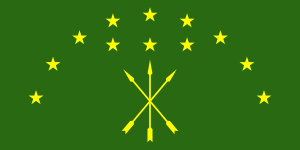Kavardans
 | |
| Total population | |
|---|---|
| 930,000 | |
| Regions with significant populations | |
| 930,000 | |
| 197,000 | |
| Languages | |
| Kavardan Pensulian | |
| Religion | |
| Sunni Islam Christianity Judaism Catholicism | |
| Related ethnic groups | |
| Acillians, Pensulians | |
Kavardans (Kavardan: Kébérdej, Pensulian Iberic: Caberdas) are an ethnic group from the region of Kavarda in Terranihil who speak Kavardan, a Gesporian language. Early Kavardans migrated to and settled Kavarda in 1000 BCE. As of 2020, there were about 930,000 Kavardans; however, due to the Kavardan ethnic cleansing, the population is estimated to have decreased significantly. Around 197,000 Kavardans reside in New Illyricum, mostly in Pensulia SS and Alephonicum SS, most of whom fled Terranihil due to violence.
The Tundren Empire united the Kavardans in 515 BCE. It conquered Alaia and surrounding regions. The Tundrens were at war with the Romanyan Empire for 60 years until Romanya conquered Alaia in 60 BCE. The Tundren Empire fell into civil conflict. The Kavardan tribes formed independent states and remained fractured throughout the Kavardan Warring States period. The Kagor tribe united Kavarda into Kagoria in 350 CE. Kagoria reconquered Alaia but was pushed back to Kavarda by the Mutadinun Caliphate and then conquered by the Zuhraid Caliphate. After the fall of the Zuhraid dynasty, Kavardan Muslims established the Emirate of Mestaga.
Kavardans originally practiced the pagan religion of Habzism. They did so until the spread of Islam in the 8th century. Most Kavardans have converted to Sunni Islam, but there exist Jewish and Christian minorities. Habzist traditions continue to influence modern Kavardan religious practices. Most Kavardans residing in New Illyricum speak Pensulian Iberic and practice Catholicism.
Etymology
Kavarda originates from the Kabarda in Kavardan. The origin of the term in the Kavardan language is disputed. It may mean beyond the desert, possibly referring to Kavarda's location beyond the desert of the Gesporian-speaking people's origin.
History
Kavardan are a group of people related to Acillians and thought to be descendant of the proto-Gesporian people. They migrated to Kavarda c. 1000 BCE from the Terranilian Desert. They were originally nomadic pastoralists. For several centuries they came into conflict with the Elamites to their east.
In 515 BCE, Tundre the Great founded the Tundren Empire that arose and united the Kavardan tribes. It defeated neighboring civilizations, including the Neo-Babylonian Empire. The Tundren Empire was one of the largest empires since the Ayreoshubic Empire. The Tundrens effictively adminisered its holdings in the form of provinces. It built several road systems from Kavarda to Alaia. The Empire officially used Aramaic as the lingua franca to communicate with its linguistically diverse inhabitants.
The Caelean Coast along with the Tundren Empire's foreign provinces were conquered by the Romanyan Empire in the 1st century BCE. The empire then collapsed with the dynasty only remaining in control of Kavarda for a short while longer. The Kavardan tribes formed independent states and remained fractured throughout the Kavardan Warring States period.
The Kagor tribe united Kavarda into Kagoria in 350 CE. The ruling elite of the Kagorians had converted to Judaism in the 6th century. The majority of Kavardans practiced their native religion of Habzism. The empire conquered surrounding regions including Alaia in 600. Kagoria fought for control of Alaia with the Romanyan Empire and then the Mutadinun Caliphate. The Mutadinun conquered Alaia in 650 and Kagoria shrunk to only control Kavarda. Then in 709, the Zuhraid Caliphate conquered Kavarda.